Amid the coronavirus crisis, dental patients and dental staff also require adequate protection from any potential infection that can arise through aerosol-generating procedures. The World Health Organization (WHO) also advised on Tuesday that dentists should prefer returning to work only in places where the coronavirus threat has eased or is easing. They are also required to work in personal protective equipment.
At present, there is no sufficient data available on the spread of coronavirus in a dentist’s office. They are therefore calling for research into the common procedures that are carried out in such offices such as those that can produce tiny floating particles that are capable of causing dangerous infection if inhaled.
These procedures in question include three-way/water spray, it is a piece of ultrasonic equipment used for cleaning and removing deposits from the surfaces of teeth, other uses include polishing, according to WHO.
Benoit Varenne is a WHO dental officer. He said in a briefing that the organization recommends that in cases of transmission in communities, people should give priority to only either urgent or emergency oral cases. He recommends that people avoid and minimize getting procedures that have the possibility of generating aerosol for treatment. It is recommended that non-essential oral health care be avoided during the health crisis to prevent transmission.
Also Read: We May Be Able to End the Coronavirus Pandemic, WHO Offers Hope
Since the transmission of coronavirus through aerosol, airborne particles and microparticles is largely unknown, Varenne calls for more research to be carried out on the area for better judgment on the issue.
Last month the WHO also released general guidelines on the possibility that coronavirus could be spread through the air and seemed to acknowledge a few reports that alluded to it being an airborne transmittable disease. The organization did however did not confirm officially or fully acknowledge that the virus could be spread through the air.
The organization emphasizes that in the chance occurrence that dental facilities do need to reopen, they must have sufficient ventilation so that the risk of coronavirus transmission can be reduced. This will help protect patients as the virus is easily transmitted in closed settings where ventilation is limited.
Varenne also noted that the organization acknowledges that the most important issue currently however is linked to the availability of important personal protective equipment, PPE, for the health care personnel that are assisting or undertaking any clinical procedures.
In England, the British Dental Association (BDA) has also released warnings saying dentists won’t be returning normally back to dentistry.
Professionals were notified last week that they could only enjoy reopening if they have appropriate measures of safety in place.
Most dentists however complain that they lack the necessary equipment for implementing important measures of safety.
In a poll taken from 2,053 dentists in England shows only a third of the number plan to return to work.
Also Read: CDC will No Longer Collect Coronavirus data, Announcement Raises Concerns
BDA chair Mick Armstrong has also remarked that the quality of service would not be like that experienced before because it is not easy to reopen given the current circumstances.
The practices that are planning to reopen are facing the dilemma of having rocketing costs and fewer patients to which they are expected to cater to.
The problem that most dentists face currently according to the BDA poll is the lack of personal protective equipment (PPE), it is one of the major issues that hinder safe and protective reopenings.


